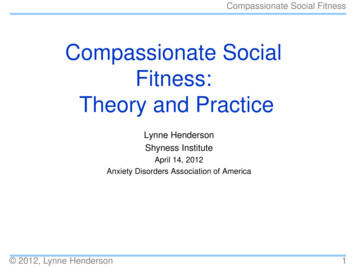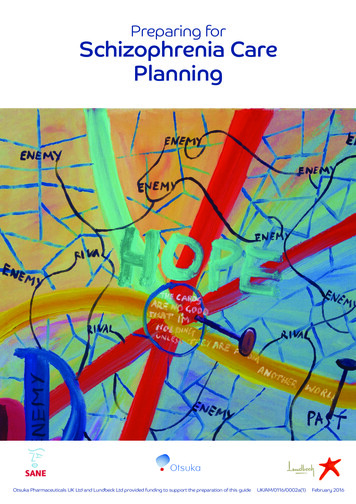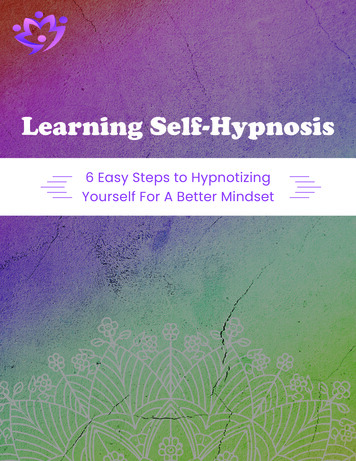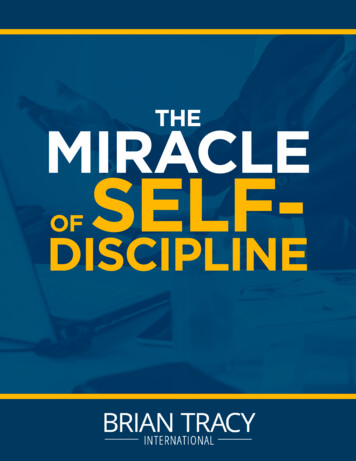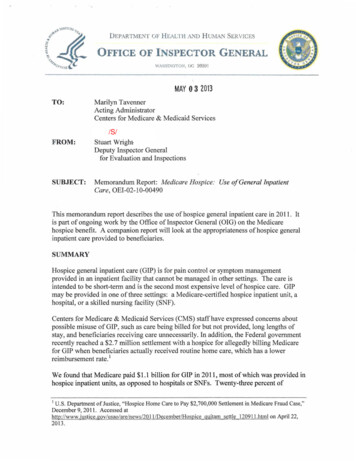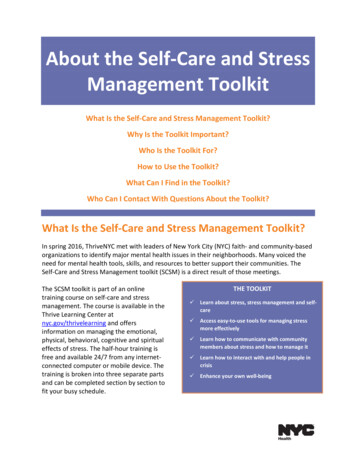
Transcription
About the Self-Care and StressManagement ToolkitWhat Is the Self-Care and Stress Management Toolkit?Why Is the Toolkit Important?Who Is the Toolkit For?How to Use the Toolkit?What Can I Find in the Toolkit?Who Can I Contact With Questions About the Toolkit?What Is the Self-Care and Stress Management Toolkit?In spring 2016, ThriveNYC met with leaders of New York City (NYC) faith- and community-basedorganizations to identify major mental health issues in their neighborhoods. Many voiced theneed for mental health tools, skills, and resources to better support their communities. TheSelf-Care and Stress Management toolkit (SCSM) is a direct result of those meetings.The SCSM toolkit is part of an onlinetraining course on self-care and stressmanagement. The course is available in theThrive Learning Center atnyc.gov/thrivelearning and offersinformation on managing the emotional,physical, behavioral, cognitive and spiritualeffects of stress. The half-hour training isfree and available 24/7 from any internetconnected computer or mobile device. Thetraining is broken into three separate partsand can be completed section by section tofit your busy schedule.THE TOOLKIT Learn about stress, stress management and selfcare Access easy-to-use tools for managing stressmore effectively Learn how to communicate with communitymembers about stress and how to manage it Learn how to interact with and help people incrisis Enhance your own well-being
The training course and this toolkit will give you the skills you need to promote stressmanagement and self-care in your community.Why Is the Toolkit Important?As leaders, staff and volunteers of community- and faith-based organizations, your work isabout helping people live healthier, happier and more fulfilling lives. In helping people reachthis goal, you will meet people struggling with and feeling overwhelmed by stress.Stress is a part of life; it is our body’s normal reaction to situations that require a response.Short-term stress can be good. It keeps us alert and focused, helps us overcome fear andmotivates us to get things done. Stress also helps us respond to threatening or dangeroussituations.Our bodies can easily respond to small doses of sudden stress; however, our bodies are notdesigned to handle extreme or long-term stress. This kind of stress overworks our bodies andminds and can contribute to the development or worsening of many illnesses. Unfortunately,many people experience this type of long-lasting stress.This toolkit will give you the skills you need to help people manage stress.Who Is the Toolkit For?ThriveNYC created this toolkit for the leaders, staff members and volunteers of NYCorganizations and other trusted community members who are often turned to and face themental health needs of people.How to Use the ToolkitThe toolkit is divided into five (I-V) easy-to-navigate sections:I.II.III.IV.V.RefreshersTools to Help You Help OthersTools to Help You Stay Healthy and EffectiveMaterials to ShareAdditional Resources
The sections can be used together or independently depending on your needs. Clicking on asection title will provide you with a drop-down menu with subsections.What Can I Find in the Toolkit? RefreshersThis section summarizes the modules and learning objectives for the SCSM online trainingcourse. After taking the training, use the refreshers to brush up on what you’ve learned. Thelearning objectives for the online training include: Defining StressIdentifying Sources of StressRecognizing Signs of StressRecognizing Signs of Something More SeriousEngaging with Community MembersPracticing Self-CareHow and When to Connect Others to ResourcesTools to Help You Help OthersIn this section, you will find information to help you support those suffering from stress in yourcommunity. Building Stress Awarenesso Types and Sources of Stresso The Health Impact of Acute and Chronic Stresso Signs and Symptoms of Stresso Age-Specific Stress ReactionsDiscussing Stress: Pitfalls and Avoiding Themo Starting the Conversation About Stresso The Effect of Culture on Stresso Discussing Risk and Resilience FactorsDiscussing Self-Care and Motivating Otherso Explaining Self-Careo Commonly Used Self-Care Strategieso Building Wellnesso Teaching Simple Strategies
Understanding Barriers to Seeking Helpo Stigmao Lack of Support and Resourceso Overcoming BarriersFinding Additional Help and Resourceso When to Suggest Seeking Professional Helpo Recognizing the Threat of Suicide and Non-Suicidal Self-Injuryo What to Do When a Person Is Suicidalo Resources: General Mental Health Support, Suicide, Substance and Alcohol Use,Physical and Emotional Abuse, Domestic Violence, Bullying, etc.Tools to Help You Stay Healthy and EffectiveYour work is often difficult. This section contains tools to help you manage work-related stressso you can remain healthy and effective. You Can’t Pour From an Empty Cupo Burnouto Vicarious Traumao Self-Care Strategieso Steps to WellnessMaterials to ShareIn this section, you will find resources you can share with your community about stress, stressmanagement and seeking professional help. Handoutso Worksheetso Checklistso ExercisesResources by Topico Information About Stresso Self-Care, Resiliency and Wellnesso Healthy Eating and Healthy Livingo Community Resources and Programso Hotlineso Access to Benefits Informationo Mental Health Information and Serviceso Traumatic Stresso Legal or Financial Assistance
oooooooooooooo Violence, Abuse and NeglectTraining OpportunitiesCaregiving ResourcesChildren and TeensLiving With Chronic IllnessMilitary, Veterans and FamiliesPeople Living With DisabilitiesImmigrants and RefugeesSeniorsLGBTQ Individuals Serving CommunitiesAlcohol and Drug UseSuicideFaith-Based ResourcesAdditional ResourcesIn this section, you will find reports, articles and research papers about the module topics. Topics:o Stresso Traumatic Stresso Violence, Abuse and Neglecto Children and Teenso Living With Chronic Illnesso Military, Veterans and Familieso People Living With Disabilitieso Immigrants and Refugeeso Seniorso LGBTQ o Alcohol and Drug Useo SuicideWho Can I Contact With Questions About the Toolkit?If you or your organization have any questions or comments about the materials in this toolkit,please contact thrivelearning@health.nyc.gov.
Self-Care and Stress Management toolkit (SCSM) is a direct result of those meetings. The SCSM toolkit is part of an online . information on managing the emotional, physical, behavioral, cognitive and spiritual effects of stress. The half-hour training is free and available 24/7 from
